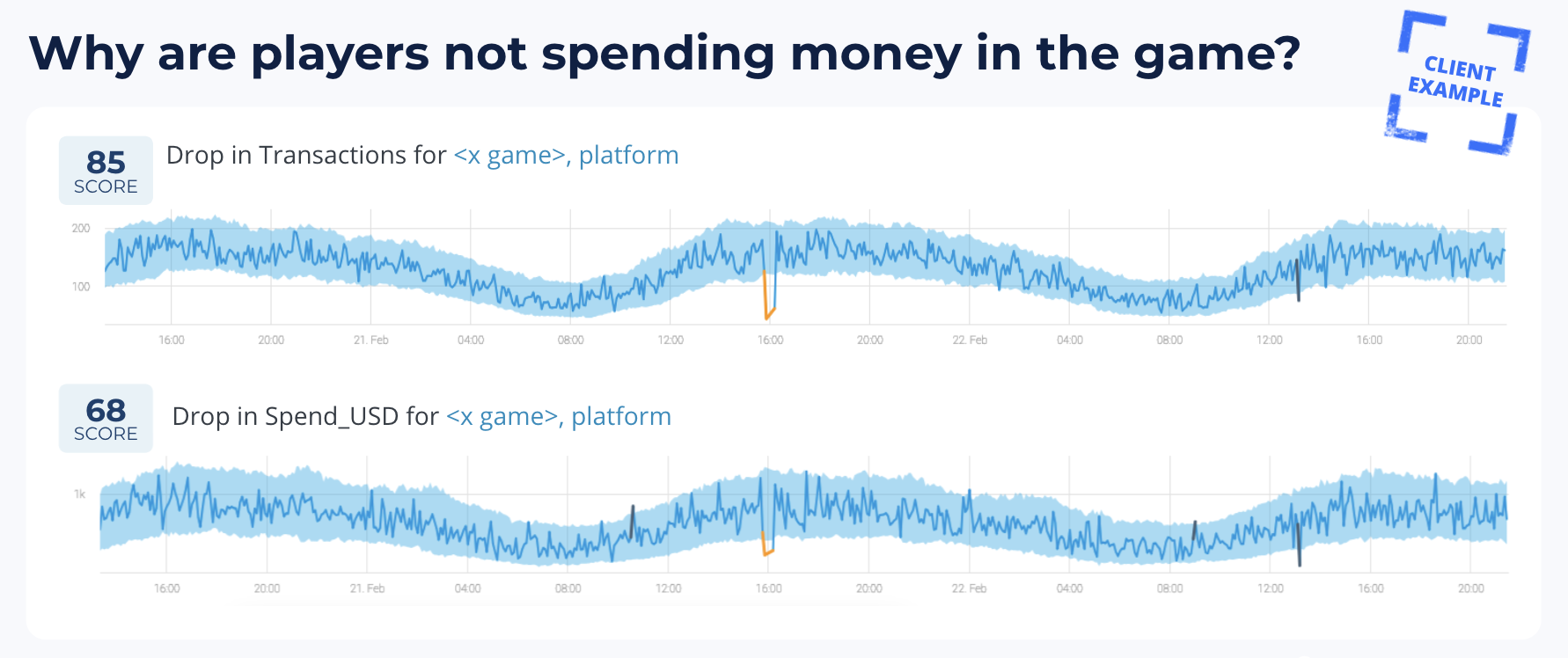In 2020, the gaming market generated over 177 billion dollars, marking an astounding 23% growth from 2019. While it may be incredible how much revenue the industry develops, what’s more impressive is the massive amount of data generated by today’s games.
The Enormous Data Challenge in Gaming
There are more than 2 billion gamers globally, generating over 50 terabytes of data each day. The largest game companies in the world can host 2.5 billion unique gaming sessions in a single month and host 50 billion minutes of gameplay in the same period.
The gaming industry and big data are intrinsically linked. Companies that develop capabilities in using that data to understand their customers will have a sizable advantage in the future. But doing this comes with its own unique challenges.
Games have many permutations, with different game types, devices, user segments, and monetization models. Traditional analytics approaches, which rely on manual processes and interventions by operators viewing dashboards, are insufficient in the face of the sheer volume of complex data generated by games.
Unchecked issues lead to costly incidents or missed opportunities that can significantly impact the user experience or the company’s bottom line. That’s why many leading gaming companies are turning to AI and Machine Learning to address these challenges.
Gaming Analytics AI
Gaming companies have all the data they need to understand who their users are, how they engage with the product, and whether they are likely to churn. The challenge is gaining valuable business insights into the data and taking action before opportunities pass and users leave the game.
AI/ML helps bridge this gap by providing real-time, actionable insights on near limitless data streams so companies can design around these analytics and act more quickly to resolve issues. There are two fundamental categories that companies should hone in on to make the best use of their gaming data:
The revenue generating opportunities in the gaming industry is one reason it’s a highly competitive market. Keeping gamers engaged requires emphasizing the user experience and continuous delivery of high-quality content personalized to a company’s most valued customers.
Customer Engagement and User Experience
Graphics and creative storylines are still vital, and performance issues, in particular, can be a killer for user enjoyment and drive churn. But with a market this competitive, it might not be enough to focus strictly on these issues.
Games can get an edge on the competition by investing in gaming AI analytics to understand user behaviors, likes, dislikes, seasonality impacts and even hone in on what makes them churn or come back to the game after a break.
AI-powered business monitoring solutions deliver value to the customer experience and create actionable insights to drive future business decisions and game designs to acquire new customers and prevent churn.
AI-Enhanced Monetization and Targeted Advertising
All games need a way to monetize. It’s especially true in today’s market, where users expect games to always be on and regularly deliver new content and features. A complex combination of factors influences how monetization practices and models enhance or detract from a user’s experience with a game.
When monetization frustrates users, it’s typically because of aggressive, irrelevant advertising campaigns or models that aren’t well suited to the game itself or its core players. Observe the most successful products in the market, and one thing you will consistently see is highly targeted interactions.
Developers can use metrics gleaned from AI analytics combined with performance marketing to appeal to their existing users and acquire new customers. With AI/ML, games can use personalized ads that cater to users’ or user segments’ behavior in real-time, optimizing the gaming experience and improving monetization outcomes.
Using AI based solutions, gaming studios can also quickly identify growth opportunities and trends with real-time insight into high performing monetization models and promotions.
Mobile Gaming Company Reduces Revenue Losses from Technical Incident
One mobile gaming company suffered a massive loss when a bug in a software update disrupted a marketing promotion in progress. The promotion involved automatically pushing special offers and opportunities for in-app purchases across various gaming and marketing channels. When a bug in an update disrupted the promotions process, the analytics team couldn’t take immediate action because they were unaware of the issue.
Their monitoring process was ad hoc, relying on the manual review of multiple dashboards, and unfortunately, by the time they discovered the problem, it was too late. The result was a massive loss for the company – a loss of users, a loss of installations, and in the end, more than 15% revenue loss from in-app purchases.
The company needed a more efficient and timely way to track its cross-promotional metrics, installations, and revenue. A machine learning-based approach, like Anodot’s AI-powered gaming analytics, provides notifications in real-time to quickly find and react to any breakdowns in the system and would have prevented the worst of the impacts.
Anodot’s AI-Powered Analytics for Gaming
The difference between success and failure is how companies respond to the ocean of data generated by their games and their users. Anodot’s AI-powered Gaming Analytics solutions can learn expected behavior in the complex gaming universe across all permutations of gaming, including devices, levels, user segments, pricing, and ads.
Anodot’s Gaming AI platform is specifically designed to monitor millions of gaming metrics and help ensure a seamless gaming experience. Anodot monitors every critical metric and establishes a baseline of standard behavior patterns to quickly alert teams to anomalies that might represent issues or opportunities.
Analytics teams see how new features impact user behavior, with clear, contextual alerts for spikes, drops, purchases, and app store reviews without the need to comb over dashboards trying to find helpful information.
The online gaming space represents one of the more recent areas where rapid data collection and analysis can provide a competitive differentiation. Studios using AI powered analytics will keep themselves and their players ahead of the game.




